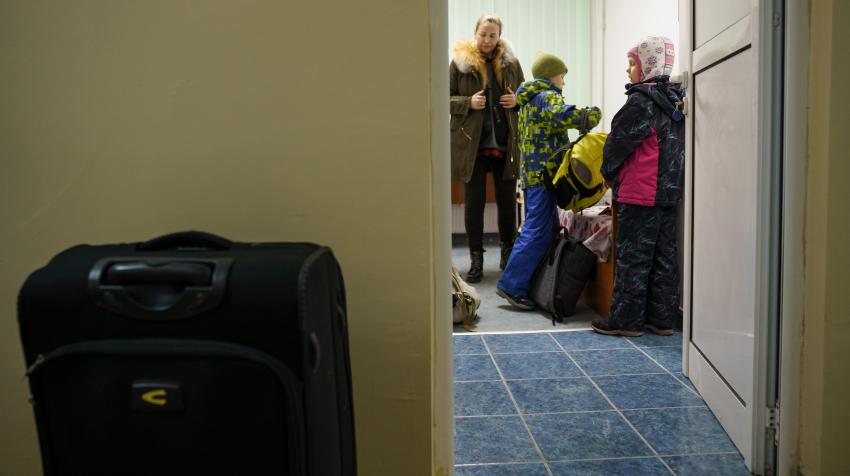“Nearly 4.9 million people have been displaced by the ongoing hostilities in Ukraine, including more than 3 million who have fled across international borders,” warned a situation report published by the United Nations on 16 March 2022 - these numbers continue to rise as the invasion and destruction in Ukraine continue. A day later, Raouf Mazou, Assistant High Commissioner for Refugees, alerted Member States of the UN Security Council of the significant impact those fleeing the war would have on countries neighboring Ukraine.
The University of Bucharest, a member institution of the United Nations Academic Impact (UNAI) in Romania, has responded with unconditional support to refugees from Ukraine. “In these difficult and uncertain times, we have supported Ukrainians severely affected by this atrocious war. Accommodation, food, and other necessary things have been provided to those in need. And we continue doing it,” commented Professor Marian Preda, Rector of the university.
During the war’s first days, the university identified more than 300 places in its dormitories for hosting refugees. This was a practical approach to one of the most pressing and urgent needs of those fleeing Ukraine: secure accommodation with at least basic supplies. But these dormitories have been much more than a place to shelter – they are a place for hope.
At the same time, through donations from the general public and the private sector; fundraising campaigns of students’ associations, teaching, technical and administrative staff; and the university’s foundation ‘Virtute et Sapientia’, a continuous supply of food, hygiene products and valuable items such as blankets have been provided to those coming from Ukraine.
As of the 23 March, the university provided more than 4,200 nights of accommodation covering the needs of 730 persons fleeing from Ukraine, including a significant number of foreign students from African, Asian and European countries, as well as mothers with children. Hundreds of volunteers cook and deliver two hot meals per day for those hosted in the dormitories and organize donation campaigns, sort items, and prepare welcome kits. The teaching staff has also provided mentorship, research resources, Romanian language courses, and counseling for alternative accommodation and on everyday life in Romania.
The university has started to receive applications for study from refugees, since many of its programs are taught in multiple languages. However, many students have expressed a willingness to learn Romanian to continue their studies. Some of the applications received came through the platform uni4Ukraine, an initiative of students and teaching staff located primarily at the University of Bucharest.
Launched less than a week after the war began, the platform, which is coordinated by Professor Luciana Alexandra Ghica, Director of the Centre for International Cooperation and Development Studies, identifies, monitors, and presents in a user-friendly manner existing resources and actions that support those who flee Ukraine via Romania, with particular attention granted to the needs of ‘academic’ refugees like students and professors, and their families.
The platform quickly attracted support from students and teaching staff from across the university, as well as other Romanian and European universities, becoming a major information hub for local, national, and international initiatives. Professor Ghica explained that “these were spontaneous actions of very different people, many of whom had never met before but started to collaborate as if they knew each other for a lifetime. Despite the many challenges, hundreds of volunteers have shown genuine leadership and solidarity, putting together resources, knowledge, and energy. Whether for the local initiatives within the university or as part of other national or international efforts, everybody who wanted to help found a way to make a difference.” underlined Professor Ghica. Nationally, the university has become one of the largest pools of volunteers to address the humanitarian impact of the war.
Lutz Drieling, a 25-year-old from German student at the University of Bucharest and one of the many volunteers, summarized what many hope that academic community solidarity can achieve: “We hope that people will find peace and that everyone who wants to go back to Ukraine will be able to do so. And we hope that Ukraine will have peace soon and receive all the support it needs.”
The university also joined as a partner the 12 March charitable concert organized in Romania for the benefit of Ukrainian refugees, an event attended by many students that collected over 1 million USD in several hours. These resources are being used by the Romanian Red Cross to deliver and manage its humanitarian assistance.
Professor Preda, the university's rector, summarized that “we all must show solidarity and support to the Ukrainian people, as this is a key moment that shows us that we should never cease to protect our values through individual, civic or institutional actions. Only by protecting life and peace, cultivating common dialogue and mutual respect, can we thrive as nations and humankind could thrive too.”

